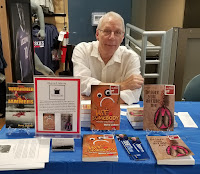About ten years ago, I attended a conference where an agent warned the audience that he and his colleagues wouldn't even look at submissions from writers who had self-published. At that time, prevailing wisdom said writers were self-pubbed because their work couldn't meet industry standards.
Mystery writer Joe Konrath and others disputed that claim, saying they were treated badly by the traditional monopoly and could make more money on their own. That argument gained weight when NYT bestseller Barry Eisler turned down a half-million-dollar advance from his traditional house and began publishing his books himself. It's worth noting that because of his successful track record, Eisler had thousands of followers, an advantage the average writer can't claim.
Everything influences everything else, and sometimes that's not a good thing. Self-publishing continues to grow, and it takes a substantial bite out of traditional sales. Last year, nearly a million self-published books appeared. Even if they each only sold one copy, that's a million books that the Big Five didn't sell, and it affects their bottom line.
Traditional markets have consolidated or disappeared. Since there are fewer paying markets, the remaining ones are swamped, for short stories as well as novels. Alfred Hitchcock Mystery Magazine receives over 1000 submissions a week. Even if you read only the first page, 1000 minutes is over 16 hours, which means the slush pile grows more quickly than the rejection letters can go out.
The numbers hamper novelists, too. There are five independent book stores within thirty miles of my condo, and while they all say they support local writers, they do it by charging fees for shelf space and offering consignment splits that range from generous to usurious. They have two reasons for this.
First, self-pubbed authors won't offer the same 60% discount and free shipping and returns for a full refund that traditional publishers do. Bookstores need that break...unless they can stage an event that guarantees lots of sales. If it rains, snows, is too hot, or another event nearby falls on the same day, audience may not show up. a large audience doesn't mean large sales anyway.
Second, traditional publishers take manuscripts that have already been vetted by an agent and will edit them professionally, maybe more than once. It's no longer true that all self-pubbed books are terrible (see Eisler, above), but the only way to find the good ones is to read them. How long would you need to read one million pages to make your choice?
Most libraries follow the same reasoning. I offer a discount and free delivery for libraries that order several of my books, but few accept my offer because their guidelines in the face of annual budget cuts insist they focus on Lee Child and Stephen King because they know the demand is there. It makes sense, but it deprives the patrons of finding new authors to enjoy.
I suggest to those libraries that they buy digital copies of my work because the price is lower and people can borrow several copies simultaneously. That's not making headway either, but I'm trying to offer more options so my work gets read. Besides, if more people read my stuff, I might get more workshop gigs. Those have tapered off because of those same budget cuts. I'm finding new venues and splitting fees, but nobody is making out like Charlie Sheen here.
If your book is on a shelf somewhere, it needs an eye-catching cover. My cover designer does brilliant work. He's also my largest set expense, and I'm not selling enough books at events to break even.
More change...More adjustments...
My next novel, due out at the end of this year, will probably be my last paper book.
I have four stories at various markets and four more in progress. By the end of the year, I may be releasing the unsold stories in digital format. I'm studying GIMP so I can design my own covers.
When you're a writer, you always live in interesting times.
What are you doing differently now?



















































